Trekking In The Post-COVID Era: All You Need To Know
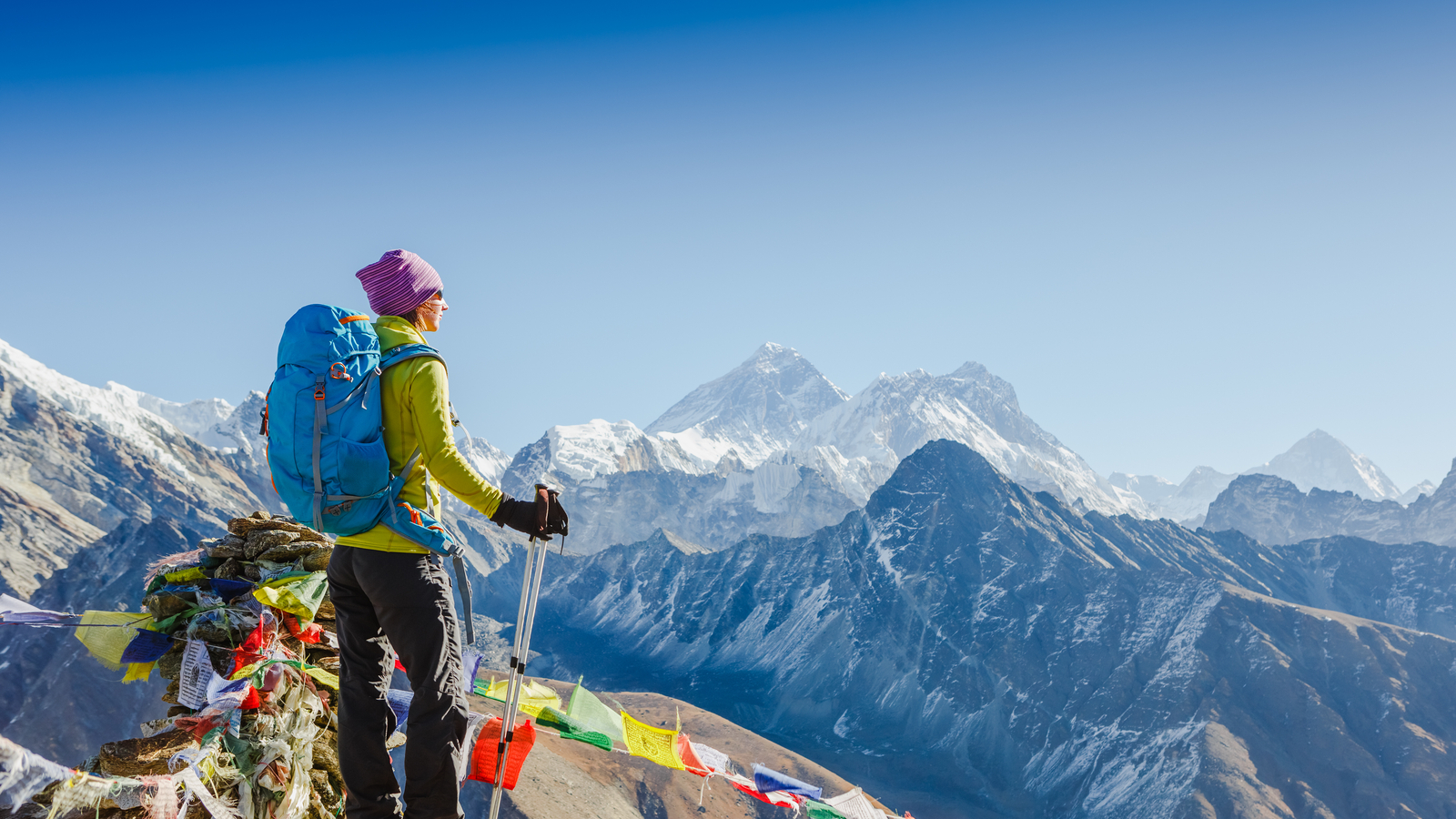
Quick Jumplinks to Navigate
With various treks across the Himalayan region in India resuming for travellers in the post-COVID era, there is a big question mark on the safety of trekkers going on these trips. While trekkers are still unsure of the protocols they need to follow and check for, before they choose a trek, there are several local partners who are already sticking to strict safety guidelines for a safe trip.
To clear the air and help trekkers plan a safe trip, we’re here with the most popular treks that have resumed, safety measures being followed by our local partners and more. Before you choose your next adventure, make sure you do your part and train for your trekking trip. And now, read on!
Popular Treks That Have Resumed In Himalayas
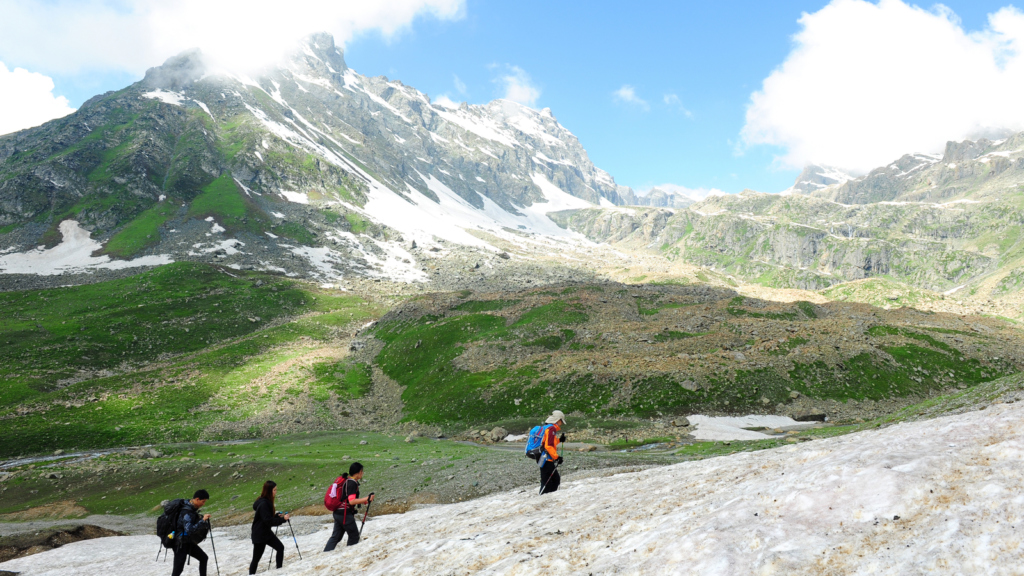
- Brahmatal Trek
- Dayara Bugyal Trek
- Deoriatal Chandrashila Trek
- Kedarkantha Trek
- Kasol Kheerganga
- Everest Base Camp
- Bhrigu Lake Trek
- Gomukh Tapovan
- Buran Ghati Trek
- Prashar Lake Trek 2020
- Har ki Dun
- Kareri Lake Trek
- Beas Kund Trek
- Triund Trek
- Laka Glacier Trek With Triund
Precautions Being Taken By Thrillophilia’s Local Partners For Trekkers’ Safety
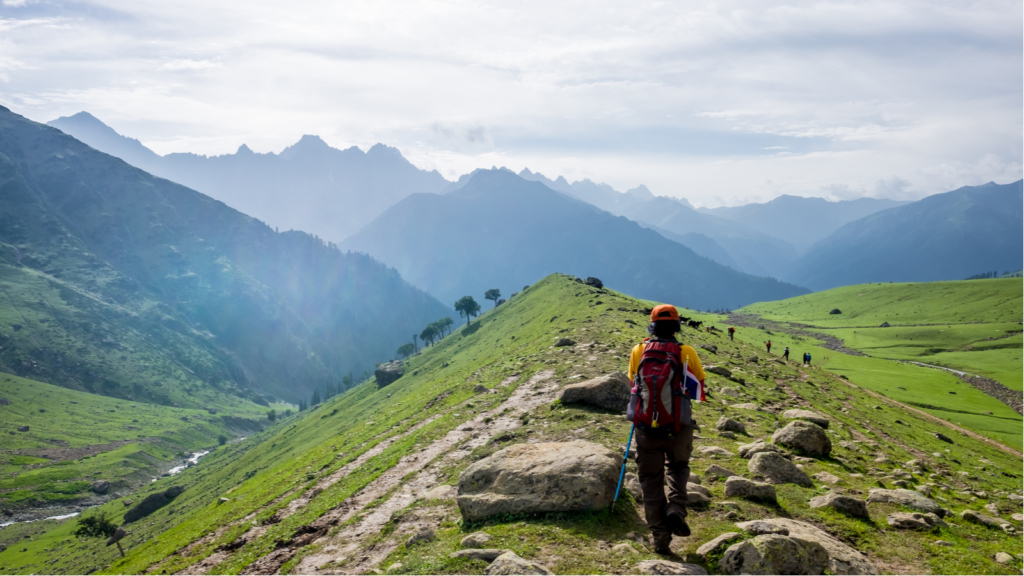
Thrillophilia’s local partners across India are taking utmost care of the safety of all their customers. With strict adherence to the issued guidelines and enhanced safety measures and hygiene protocols, our local partners are making treks across India safe for all!
Before The Trip
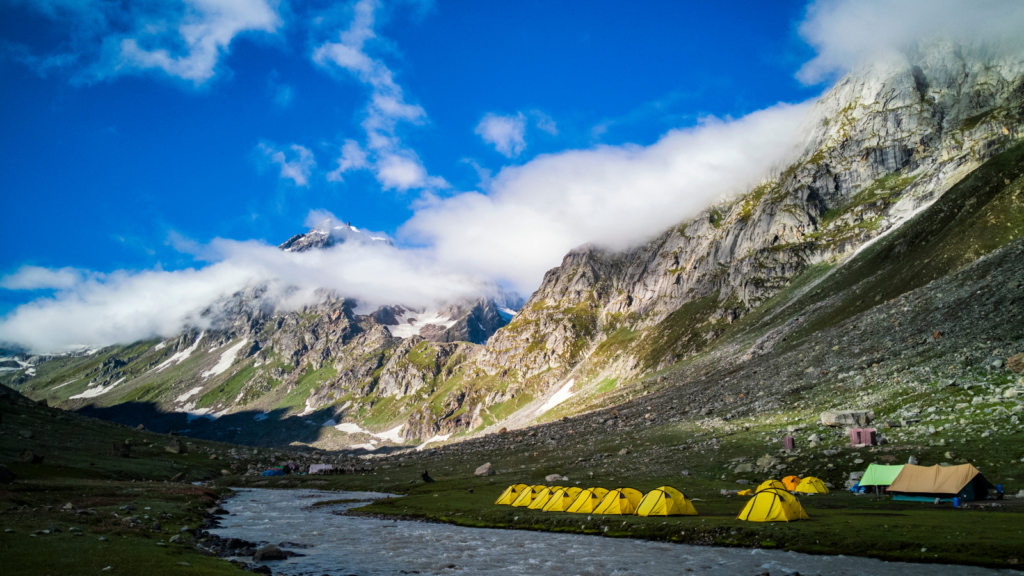
Before the trek starts, our local partners will take all safety precautions to ensure a smooth trip. This includes:
- COVID-19 symptom checking for all members of the trek group including the staff and trek leader
- Getting health declaration forms signed by all trekkers and staff
- If travelling to Uttarakhand or Ladakh, trekkers may require a COVID-negative certificate. The same will be checked by our local partners.
- Ensuring possession of hand sanitizers, masks, etc by all the members of the trek group
During Transit

- The vehicles being used by our local partners for trekkers’ transit during the trek will be fully sanitized before use.
- The vehicle will also be fully equipped with hand sanitizers. The driver of the vehicle will be wearing a mask at all times and maintain personal hygiene.
- All restaurants chosen by the partners for breakfast and lunch during the transit will be abiding by all safety measures and be deeply sanitized for trekkers’ safety. Various social distancing measures will be in place at the restaurants and the food will be served abiding by strict safety guidelines.
At The Base Camp
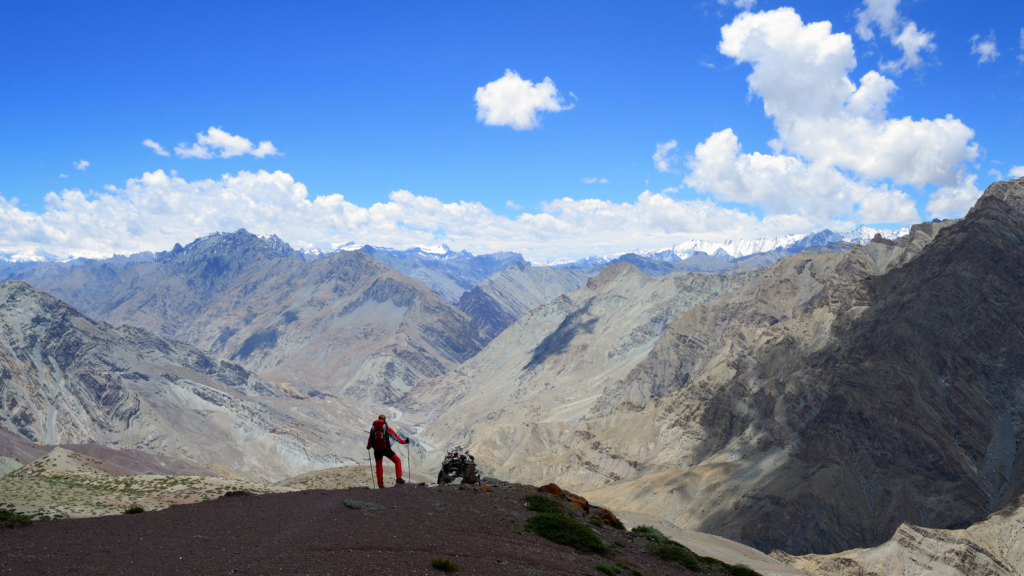
- On reaching the base camp, trekkers will have to go through various health checks to ensure theirs and everyone else’s safety. These checks will include temperature checks, oxygen level checks, etc. Trekkers will also be required to fill a health declaration form.
- After the health checks are completed, trekkers will be given a set of a freshly sanitized sleeping bag and liner. The same set will be used by them every night throughout the trip. Exchanging sleeping bags and liners will be strictly prohibited amongst the trekkers. To ensure the same, each set will have a unique identity number.
- All rooms at the base camp will be deeply sanitized for trekkers’ use.
- Trekkers will not be allowed inside the kitchens, or to come in contact with any staff member at the base camp except for the trek leader. This will ensure minimum contact and further minimization infections.
- The base camp will be located in the outskirts of the village to ensure social distancing and help trekkers to stay away from the crowds.
- Before the trek starts, all the trekkers will be tested for oxygen levels and any COVID-related symptoms.
During The Trek

- All trekking equipment will be deeply sanitized before the trek starts.
- The offloading process will be completely contact-free for trekkers. The mules and the porters will leave after trekkers leave and reach the designated camp before they arrive.
- Only 2 trekkers will be allowed to stay in one tent.
- The kitchen staff and trek leaders will thoroughly wash their hands and wear masks before they start cooking and while serving meals to the trekkers.
- For dining, there will be a separate tent that will be sanitized each time before use. The tent’s size will be according to the size of the group and the windows and door flaps of this tent will always stay open.
- Trekkers will also be given sanitizers exclusively to disinfect their cutlery.
- The staff members accompanying the trekkers during the trek will be checked for COVID symptoms everyday during the trek
- A medical kit and oxygen cylinders will be available with the group at all times during the trek. The trek leader will have a COVID-19 safety kit at all times which will include:
- Pulse Oximeter
- Infrared Thermometer Gun
- Medical Mask
- Face Shield
- Gloves
- Sanitizer
- Oxygen Cylinder
What Precautions Should Trekkers Take During The Trip
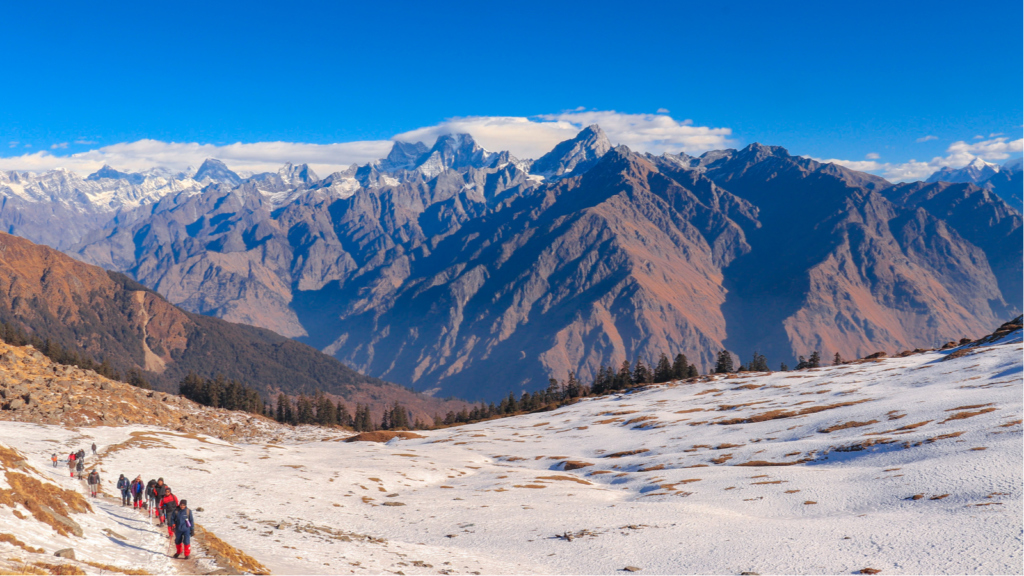
- Practice good hand hygiene throughout the trek. This includes washing hands with soap and water if visibly soiled and using an alcohol-based hand sanitizer if not. It should be made sure that if one’s hands have come in contact with respiratory secretions, they should be sanitized properly.
- Wear a mask and a pair of gloves when travelling in a vehicle and in public spaces. Avoid sitting in public areas during the transit.
- Do not exchange the designated sleeping bag, liner or tent with anyone in the group.
- Avoid interacting with other members of the group except for the trek leader.
- Avoid contact with anyone who is sick.
- Avoid touching one’s eyes, nose and mouth.
- Stay protected from insect bites with the help of insect repellent creams or by applying a moisturizer with a few drops of citronella added in it.
- Carry a first aid kit with all the basic medicines and disinfectants in a quantity that would last throughout the trip.
- Try and carry one’s own cutlery and water bottles to stay extra safe
Must-Know State Rules For Trekkers
Uttarakhand
- To enter Uttarakhand from another state or to move within districts of Uttarakhand, trekkers will need to register on the state’s smart city portal.
- Thermal screening will be done at all entry points- be it bus stations, airport, or railway stations. The same will also be done at the hotel, camps and before the trek starts.
- If one is entering Uttarakhand from other states and plans to stay there for 7 days and more, he/she will have to mandatorily go through a quarantine of 10 days in a quarantine centre. Although, he/she will be exempted from the quarantine if a COVID-negative certificate is presented, produced not before 96 hours from arrival. Trekkers will also have the option of getting tested at the airport or any ICMR authorized lab in Uttarakhand and presenting the results immediately to avoid quarantine.
- If you’re visiting Kedarnath, Badrinath, Yamunotri, Jamnotri, you will need to register on the government portal.
- Wearing masks and adhering to social distancing is mandatory for all, at all times.
- If any team member showcases any COVID-19 symptoms during the trek, the whole team will be immediately isolated and local authorities will be informed. Further, action will be taken as per their standard protocols.
Himachal Pradesh
- There are no interstate or intrastate restrictions in Himachal and no permissions required to enter the state. This means, trekkers do not need an e-pass or need to register on any portal.
- Trekkers will also not be needed to go through quarantine on entering the state.
- Wearing masks & adhering to social distancing is compulsory if trekkers are travelling in public transport or are in a public space.
Ladakh
- Trekkers have to carry a COVID negative certificate from an ICMR certified lab, no older than 72 hours to travel freely for 7 days in Ladakh. If a COVID negative certificate is not presented at the airport or road checkpoint, the traveller will be tested and advised a 7-day quarantine.
- If the trip is longer than 7 days, then the traveller will be required to take another test on the 8th day.
- A pre-booked stay at a hotel/guesthouse in Leh is mandatory.
- Nubra valley is open for Inner Line Permit.
- Pangong and Tsomoriri Lakes are closed for tourists.
- Taxis and cars can only have 1 +2 seating as per the SOP of MHA.
- Tempos can only have 1+7 tourists seated as per the SOP of MHA.
- If the traveller crosses districts, separate testing and quarantine rules will apply according to the district.
- Wearing masks and adhering to social distancing is mandatory at all public spaces.
